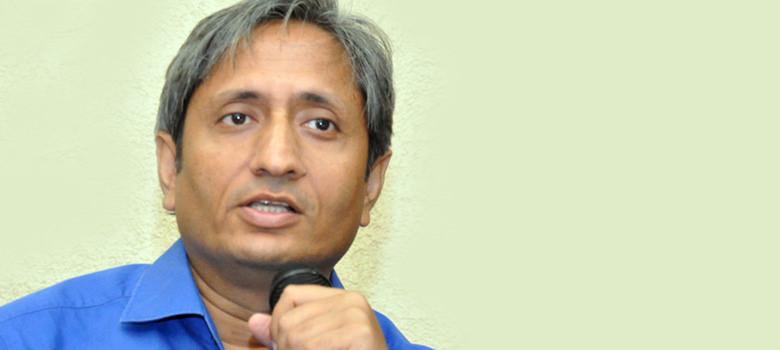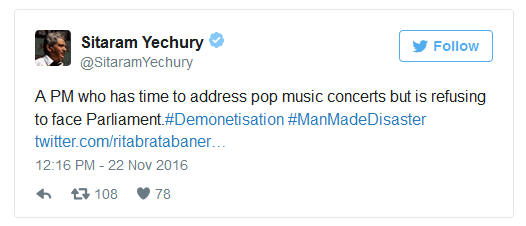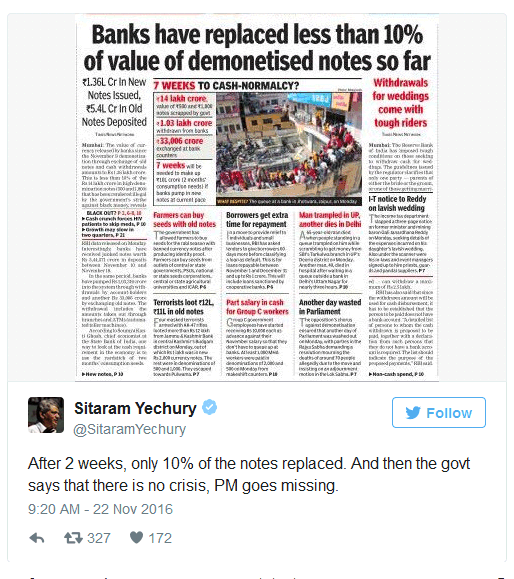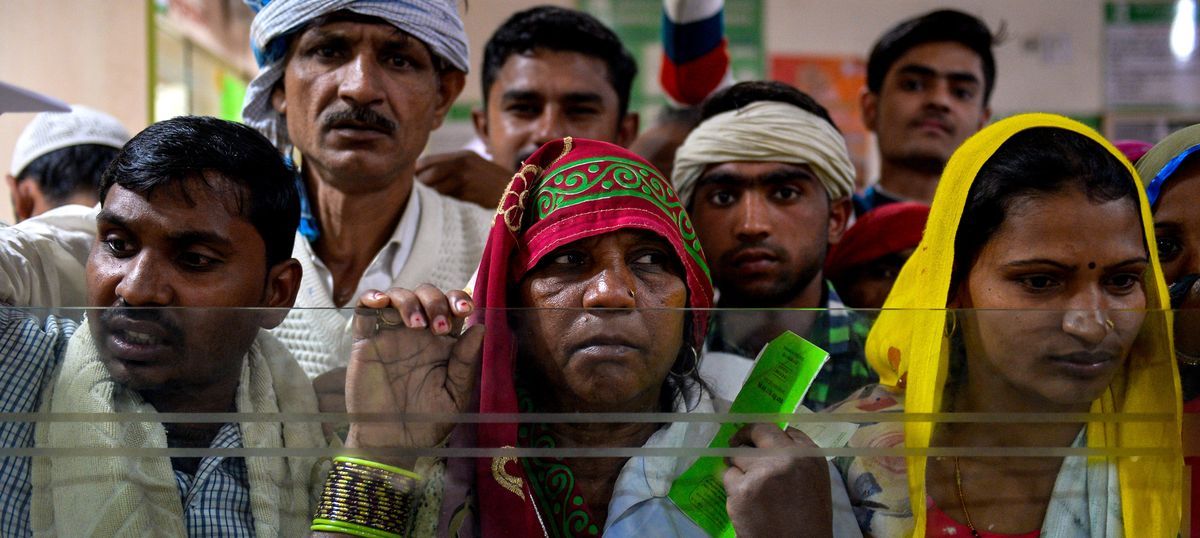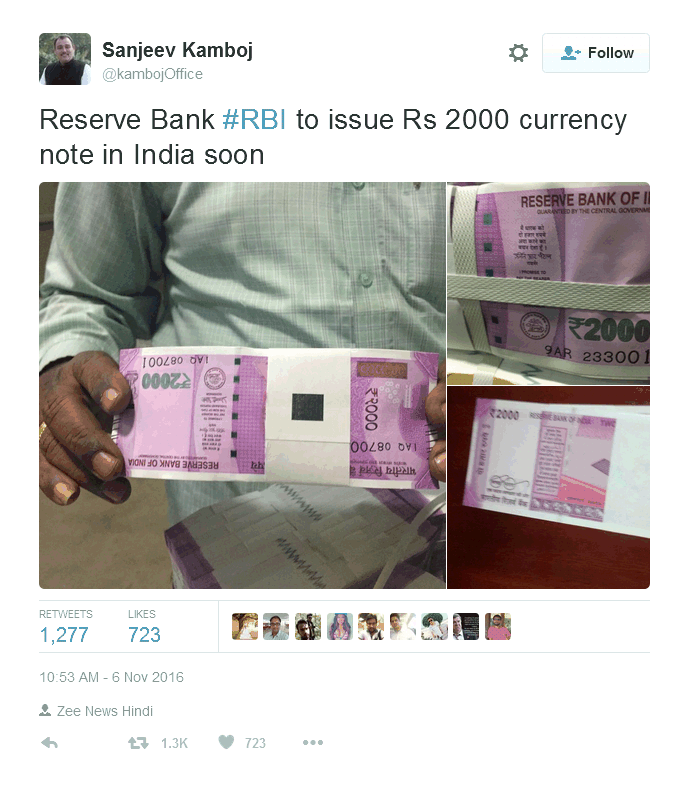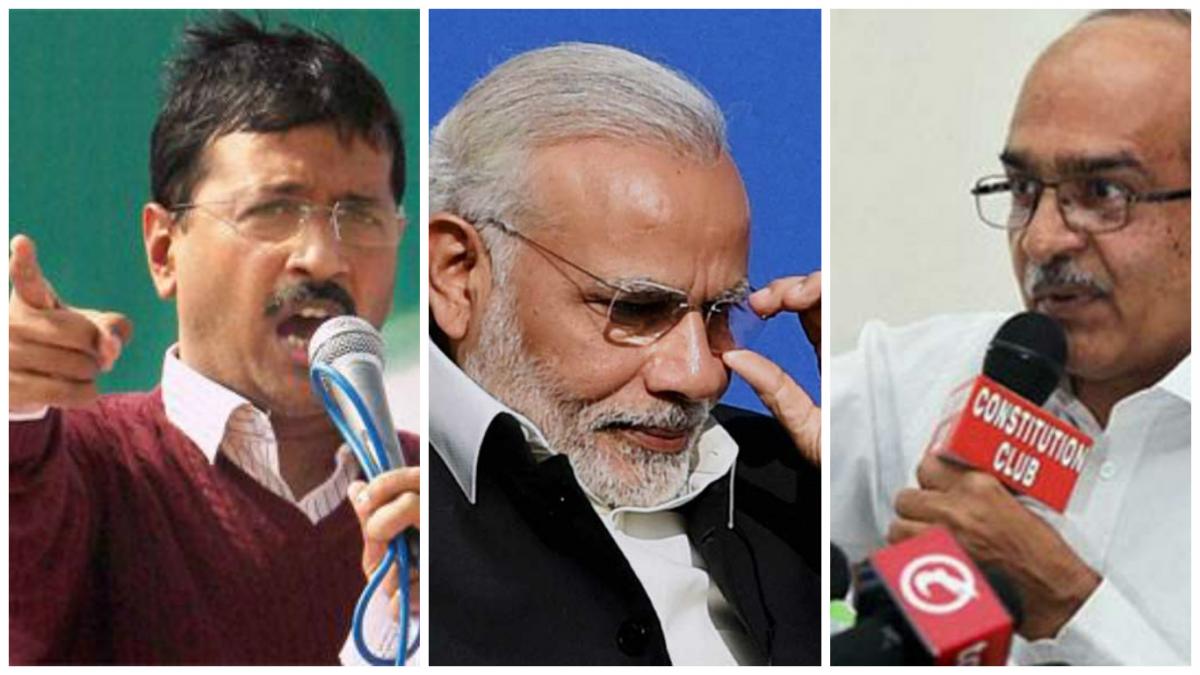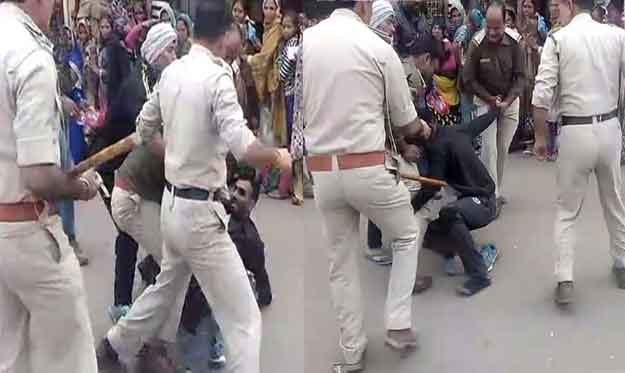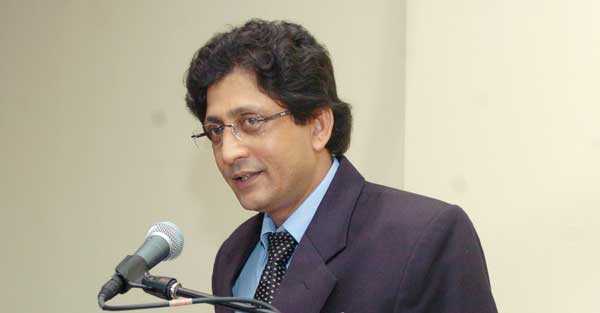 Image credit: CHANDAN KHANNA / AFP
Image credit: CHANDAN KHANNA / AFP Single mother: No medicines in Mumbai
On the night that demonetisation was announced, Shabana Sayyed’s daughter had fallen ill. A single mother with two other children to care for, Sayyed checked her wallet to see if she could afford medicines for her girl’s headache and fever.
“All I had was Rs 300 in useable currency,” said Sayyed, 35, a domestic worker from a dense slum near Bandra railway station in Mumbai. “The rest was Rs 6,000 in Rs 500 and Rs 1,000 notes, and no one gave me change for it.”
Sayyed puts in a 12-hour day working in six different homes, earning Rs 20,000 a month. Her cramped 80 sq ft room in the slum costs Rs 5,000 a month in rent, and with daily household expenses of Rs 400-Rs 500, savings are rare.

Shabana Sayyed's home. Photo credit: Aarefa Johari.
With demonetisation, Sayyed’s family has been forced to cut costs across the board to make sure their limited cash resources don’t get exhausted faster than the banks can exchange money.
“Last week it took me four hours of waiting in line to get my old notes exchanged,” said Sayyed. “And because no one had change for a Rs 2,000 note, I had to buy ration on credit for six whole days.”
Vegetables and foodgrains, says Sayyed, have grown more expensive in the past 10 days, because of the impact of demonetisation on wholesalers and retailers. “It is hard enough to buy bhaji and dal, so we have been forced to give up our regular meat,” she said.
While younger mothers in her slum were struggling to buy milk for their children, Sayyed had to walk to work – more than 3 km one way – because she didn’t want to waste precious cash on autorickshaws. “Still, I haven’t been able to get medicines for my daughter.”
How it adds up
- Income before demonetisation: Rs 20,000.
- Income now: Her next monthly salary is due in the first week of December.
- Cash exchanged: Rs 6,000 in three trips to the bank.
- Cash deposited: None. Does not have a bank account.
- Expenditure before demonetisation: Rs 6,000 monthly rent, Rs 400-Rs 500 daily .expenses
- Expenditure now: Cutting back on essentials. Made Rs 300 last for the first three days.
Hairstylist in Patna: Living precariously
Prime Minister Narendra Modi’s decision to do away with Rs 500 and Rs 1,000 notes has not been good for Guddu Sharma’s family. Sharma, 24, lives with his wife and two sons near Patna’s Boring Road, and runs a men’s salon about 30 minutes away. Since the prime minister’s announcement, he said, earnings have fallen. His salon, which charges Rs 40 for a haircut, used to make anywhere between Rs 1,000 to Rs 1,200 on the weekend. But now, he said, that has fallen to Rs 500. Regular customers – the ones who used to show up every week – have stayed away. If they do drop by, they are asking if they can pay later.
Looking at where he lived, it seemed that the salon generated just enough to support Sharma and his family. While Boring Road is one of the principal commercial streets in Patna, his home is located down a narrow lane that points north, up towards the Ganges.

Guddu Sharma, near his home in Patna.
How is he coping with this liquidity crunch? Not by going cashless. In part because he doesn’t have a bank account. “I tried to open one but they wanted too many proofs of identity,” Sharma said. “I have applied for a Aadhaar card and will try again later.” Instead, his family is cutting back on expenditure. “We did not buy new stock for the salon. And we did not pay our house rent this month.”
Such deferred expenses, he said, have reduced his monthly expenditure by Rs 12,000. Even with that, he has had to make other cuts – even on essentials like food. “We are buying less,” Sharma said. “If we earlier bought vegetables for Rs 40, we are now spending only Rs 20. We used to buy a bora [sack] of rice at a time. But, right now, we are buying 3 kilos, 4 kilos at a time. That works out more costly as well.”
It is a tenuous time. Even as incomes fall, food prices are starting to rise. Between November 8 – when Modi made his announcement – and now, says Aruna Devi, who lives in the hut to the right, the price of wheat has climbed from Rs 22 to Rs 28 a kilo.
How it adds up
- Income before demonetisation: Rs 1,200 per weekend.
- Income now: Rs 500 over the last weekend.
- Cash exchanged: None. Had spent all savings during the festival of Chhath.
- Cash deposited: None. Does not have a bank account.
- Expenditure before demonetisation: Rs 12,000 on house rent and salon provisions.
- Expenditure now: Deferred both rent and provisions. Cutting back on essentials.
Farmer in Tamil Nadu: Wilting crops
After ten days of daily visits to the cooperative bank, R Vedagiri was finally able to return home with some money in hand last week. But the single Rs 2,000 note was not adequate for this farmer from Royalpattu village, 40 km from Chennai.
It has been three weeks since Vedagiri’s single acre of land had been tilled and paddy seedlings had been sown. But he still has to receive more than Rs 15,000 from the cooperative ban, of the Rs 20,000 to which he is entitled every ten months.
“The cooperative bank cannot lend us money now, so for the whole of last week, our crop has been standing without pesticides,” said Vedagiri. Several times last week, Vedagiri and the other farmers of Royalpattu were turned away by bank employees. New currency notes have been slow to reach most rural cooperative banks across India.
While sowing the crop, Vedagiri had employed 20 labourers. But he has been unable to pay any of them since he had not still received the rest of the money from the cooperative society. “I feel so ashamed passing by them each time,” said Vedagiri. “Every time they ask me for their money, I have to give them the same excuse. They too need money to eat.”
Most times, after the crop is harvested, Vedagiri makes a profit of Rs. 20,000. To make ends meet, he also works on one of neighbour’s field once in a while, earning Rs 200 a day. But with little money coming from the cooperative bank, Vedagiri does not know how he will get through this cropping season without incurring a loss. “Neither the cooperative society nor moneylenders are taking our jewellery and giving us loans,” he said. “Also, it has hardly been raining this season. I am worried that our crops will soon start turning yellow.”
With hardly any savings in the bank, and with a weekly expenditure of Rs 2,000, Vedagiri is worried. “My only consolation is that my daughter is studying engineering for free, being the first graduate of our family,” he said.
How it adds up
- Income before demonetisation: Rs. 2,000-Rs 3,000 a week, Rs 20,000 after harvest.
- Income now: Rs 2,000.
- Cash exchanged: None. Restrictions on exchange of notes at rural co-operative banks.
- Cash deposited : None.
- Expenditure before demonetisation: Rs 2,000 a week.
- Expenditure after demonetisation: Rs 1,500.
Shopkeeper in Delhi: Drop in sales
On Sunday afternoon, 75-year-old Lal Chand Jain settled into a chair at his garment shop in Old Delhi’s Chandni Chowk. Heaving a sigh of relief, he said, “Finally, things have settled down.”
The Jains, who hail from Dehradun in Uttarakhand, have been in the garment trade for three generations. The shop is managed by the septuagenarian and his two sons Manoj and Yogesh.
“We accepted old notes for a good few days even after the announcement but now we have stopped that,” said Jain. Once they stopped taking old notes, they had to turn away a lot of customers who came with Rs 500 and Rs 1,000 notes.
“The cash in the drawer soon dropped down to zero,” he said. “In a few days, we landed in a situation in which we also had to refuse customers who came with the new Rs 2000 notes as we had no change. Sales dropped severely.”
But the cash situation has since eased up. Fishing out a healthy bundle of Rs 100 notes from the drawer to give change to a customer, Jain said, “For once, we all were scared as the announcement was made days after the winter wear collection had arrived. However, the problem was temporary.”
He added: “It is a very good step that the government has taken. Those who sleep with black money stashed within their mattresses will have a hard time.”
Asked about the family’s expenses, Jain pointed towards his son Manoj who was caught up in an argument with a customer who wanted to buy four sweaters but only in exchange for old denominations. Manoj finally gave up.
“For home, we procured everything on credit, from vegetables to milk and grocery,” said Manoj. “It was not a problem for us, or any of the Old Delhi-based business families I assume, as most of them are known to the traders and vendors. We are settled here for over 70 years now.”
Asked if they had to cut down on anything on their shopping list, Jain said that the family leads a simple life and only spends their money on essentials. His list of essentials, however, includes fruit and milk, which he considers necessary for a healthy diet. “I do not remember any instance except for my grandchildren complaining once or twice about having to cut down on their expenses on fast food,” Jain said.
Jain did not want to give numbers for either his income or expenditure.
Reported by Aarefa Johari in Mumbai, M Rajshekhar in Patna, Vinita Govindarajan in Royalpattu village in Tamil Nadu, and Abhishek Dey in Delhi.
This article was first published on Scroll.in
